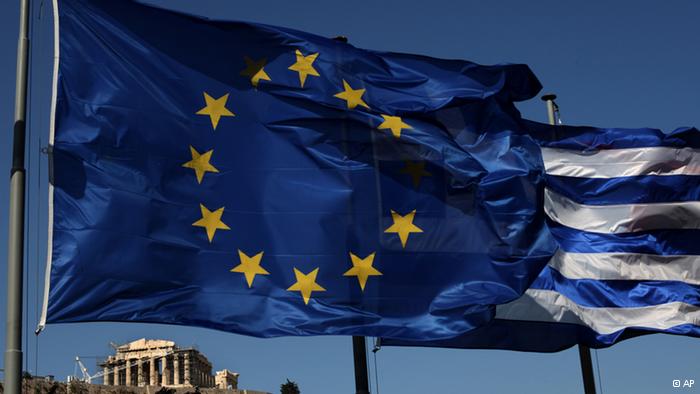Greece could be to the euro what Northern Rock was to the banking crisis
Hamish McRae , The Independent
The euro fell to a nine-year low against the dollar today. The immediate causes of this bout of jitters were twofold. One was that Greece, with an election just three weeks off, might leave the euro; the other, expectations that the European Central Bank will be forced to bring in some form of quantitative easing later this month.
The pressure on the ECB to take action will be all the greater if the eurozone inflation figures published today are close to zero. The November number was just 0.3 per cent. But the prospect of falling prices has been stalking Europe for some months, and with it an expectation that the ECB would eventually have to follow the other major central banks and go for full QE, despite political and technical objections. By contrast the possibility of Greece leaving the euro seemed to have receded through the past year. Suddenly it is back.
One of the endlessly fascinating – or frustrating – features of economics is the unpredictability of outcomes. The Greek economic story of the past decade is pretty straightforward, though distressing. But how it will end is not at all clear, and the consequences range from the benign to the dreadful, with the twist that it is not even clear which outcome would eventually turn out to be benign and which dreadful.
Angela Merkel was reported by the German magazine Der Spiegel as believing that a Greek exit from the euro would be manageable. Rationally that would seem right: it is inherently improbable that any action by an economy accounting for less than 2 per cent of the eurozone should be able to derail the project. But if what seems to be a small event reveals more fundamental flaws in the edifice, it might. Greece could be to the euro what Northern Rock was to the global banking crisis.
What has happened to the Greek economy is at the outer limits of post-Second World War experience anywhere in the developed world. The economy has shrunk for six years on the trot, losing more than one-quarter of its size. It seems that growth has at last returned, with GDP up about 2 per cent at an annual rate in the most recent quarter, and unemployment has fallen a little.
But it is still more than 25 per cent, and with youth unemployment at 60 per cent, the social and human cost of austerity has been extreme. Were it not for the safety valve of emigration those figures would be even higher.
On paper austerity has been a success, for Greece now has a primary surplus: tax revenues are higher than government outgoings, minus debt service costs. However, public debt is 175 per cent of GDP, a debt that hardly anyone believes can ever be repaid. It is very easy to understand how public support for what seems like endless austerity has evaporated.
Yet 75 per cent of Greeks, at least according to the polls, want to keep the euro. They just don’t want to pay off, or even pay the interest on, the debts. This ambiguity makes the outcome most unpredictable. We don’t know what will happen in the general election on 25 January – whether the present government, a coalition of the conservative New Democracy and socialists Pasok, will survive, or whether the explicitly anti-austerity Syriza will take power. We don’t even know whether austerity can be sustained by the present coalition.
There will have to be some further renegotiation over Greek debts, with the implicit threat of a unilateral default, either in or out of the euro. Greeks would like a “keep the euro but dump the debt” outcome. The eurozone high command, led by Germany, insist on Greece paying its debts, and hold over it – or rather may hold over it – the threat of expulsion from the euro if it doesn’t stump up.
Perhaps the best way to put this all in perspective is to note that were the European economy growing strongly everything would be fixable. Greece could have a bit more leeway on its debts, employment would start to pick up, the fiscal numbers would be not quite so dreadful, and crucially the fear of contagion – sucking in much larger economies including Italy, Spain and even France – would disappear.
But unhappily the wider eurozone outlook has deteriorated, hence the pressure on the ECB to find some way, any way, of boosting demand. That decision, to be taken at the next meeting of the ECB’s ruling council, is on 22 January.
So what will happen? Past experience of eurozone negotiations would suggest yet more muddle-through. The ECB does a little, not much. Whatever the Greek electorate decides, some modest negotiation keeps the country in the euro. The eurozone economy struggles on with a little growth, not much. But the possibility of an accident, some unexpected outcome, is large and that is why investors would rather hold dollars, and even sterling, than euros.
The story of globalisation is told by one amazing statistic
Some time this month, maybe even today, London passes its previous peak in population, reached in the summer of 1939 on the eve of the Second World War, of 8,615,245 people. The precision is spurious, for all population statistics are estimates, but the point is very real.
London is adding roughly 100,000 people a year, the equivalent of an Oxford every 18 months, or an Edinburgh every five years. This is just the 33 London boroughs, for the urban agglomeration is generally reckoned to be around 14 million. Back in 1939 the agglomeration was not much larger than the greater London area, so actually London is much bigger than it was then.
It is a success story, a challenge, and a puzzle. The success story has been so widely noted that there is not much point in adding to it here, except perhaps to note that what it offers is opportunity and that is something to be celebrated and cherished. That such growth creates a challenge is also something we are all very aware of, both in practical elements such as infrastructure and housing, but also in terms of marrying growth with harmony and social justice.
The thing that has attracted least attention is the puzzle. Why has something that was totally unforeseen happened? Even in the 1980s, the authorities were still assuming and planning for decline.
So, why in an age of seamless electronic communication do people need, or at least choose, to cluster together? The London region is home to the largest non-national professional community on earth. Why has that happened?
The explanation is globalisation – an increasingly interconnected world needs physical hubs – but to say that is to raise more questions than it answers. What is surely worth saying is that the more we can understand why London is growing, the more we will understand the ways in which the global economy is changing.



















